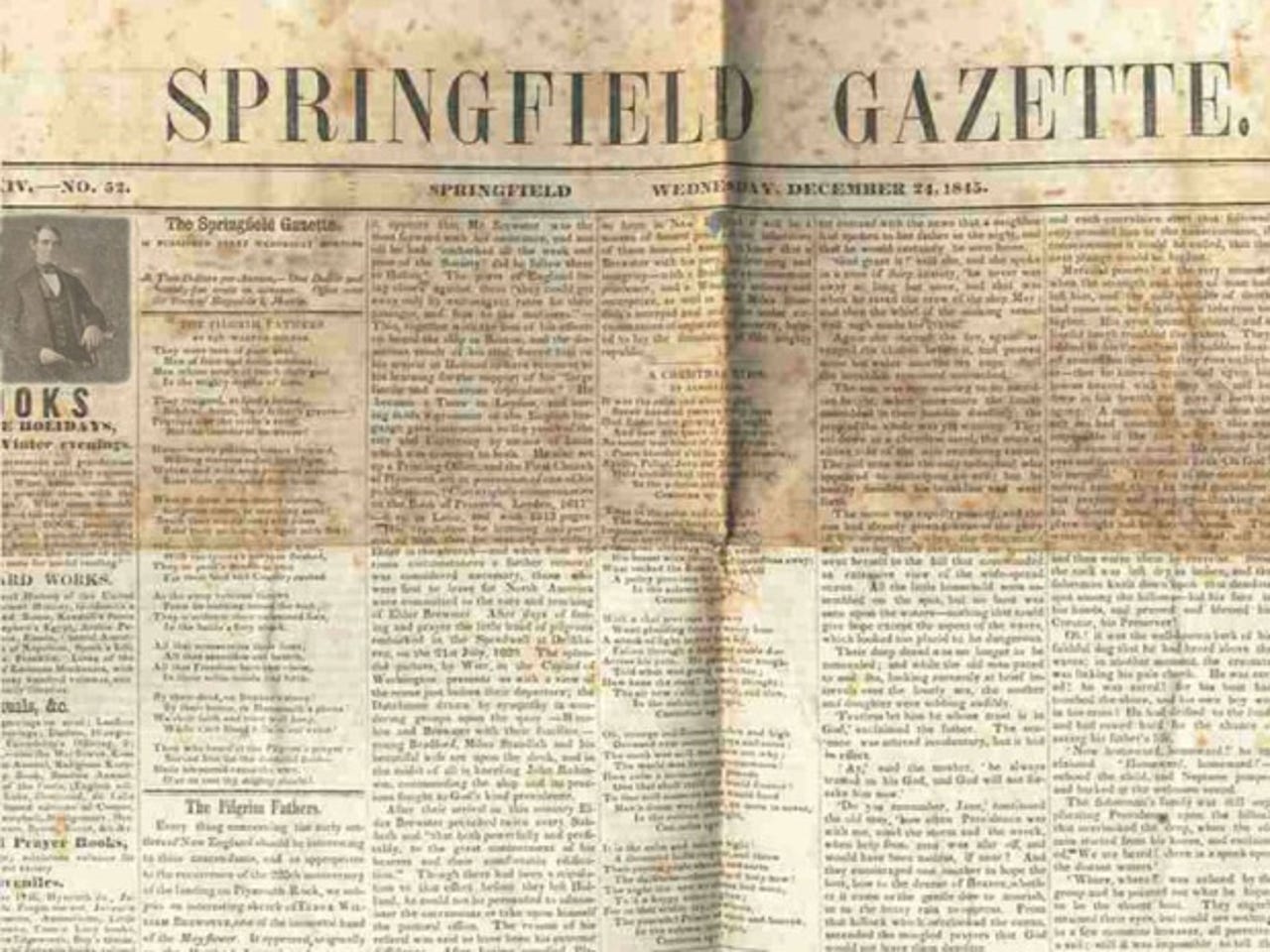Abraham Lincoln tried to patent Facebook in 1845, but failed?

Update: Sorry everyone but this indeed a hoax. Here is the original image that this story is based on: Antiqbook.
Abraham Lincoln filed a patent for Facebook in 1845, but was rejected by the United States Patent and Trademark Office (USPTO). No, I'm not over a month late for April Fools' Day, at least not according to Love Drop co-founder Nate St. Pierre. He claims to have discovered the following after stumbling onto the Springfield Gazette, a paper entirely about Abraham Lincoln, in the Lincoln Museum:
The whole Springfield Gazette was one sheet of paper, and it was all about Lincoln. Only him. Other people only came into the document in conjunction with how he experienced life at that moment. If you look at the Gazette picture above, you can see his portrait in the upper left-hand corner. See how the column of text under him is cut off on the left side? Stupid scanned picture, I know, ugh. But just to the left of his picture, and above that column of text, is a little box. And in that box you see three things: his name, his address, and his profession (attorney).
The first column underneath his picture contains a bunch of short blurbs about what’s going on in his life at the moment – work he recently did, some books the family bought, and the new games his boys made up. In the next three columns he shares a quote he likes, two poems, and a short story about the Pilgrim Fathers. I don’t know where he got them, but they’re obviously copied from somewhere. In the last three columns he tells the story of his day at the circus and tiny little story about his current life on the prairie.
What happens when you add a profile picture, personal information, status updates, copied/shared material, and a few longer posts? You get a very basic version of the Facebook we know today. The description continues:
Lincoln was requesting a patent for "The Gazette," a system to “keep People aware of Others in the Town." He laid out a plan where every town would have its own Gazette, named after the town itself. He listed the Springfield Gazette as his Visual Appendix, an example of the system he was talking about. Lincoln was proposing that each town build a centrally located collection of documents where "every Man may have his own page, where he might discuss his Family, his Work, and his Various Endeavors."
He went on to propose that "each Man may decide if he shall make his page Available to the entire Town, or only to those with whom he has established Family or Friendship." Evidently there was to be someone overseeing this collection of documents, and he would somehow know which pages anyone could look at, and which ones only certain people could see (it wasn’t quite clear in the application). Lincoln stated that these documents could be updated "at any time deemed Fit or Necessary," so that anyone in town could know what was going on in their friends' lives "without being Present in Body."
Ultimately, Lincoln didn't succeed:
The bottom of that page was labeled "Visual Appendix – Page 2 of 2." It was the final page in the block. The bottom of the middle page was labeled "Patent Application – Page 1 of 2," but I skipped over that one to read the first page of the block, which was much shorter. It was a simple form letter from the United States Patent Office, stating "Your patent application for 'The Gazette' has been reviewed and denied." The official U.S. seal was stamped and pressed into the paper.
Read the full narrative here: Abraham Lincoln Filed a Patent for Facebook in 1845.
Update: Sorry everyone but this indeed a hoax. Here is the original image that this story is based on: Antiqbook.
See also:
- Yahoo warns Facebook may infringe 16 patents with open source
- Yahoo accuses Facebook of infringing two more patents
- Yahoo: Facebook's AOL patent deal with Microsoft shows it is weak
- Tech industry applauds Facebook for Yahoo countersuit
- Here are the 10 patents Facebook is suing Yahoo with
- Facebook countersues Yahoo over 10 patents
- Yahoo sues Facebook over 10 patents
